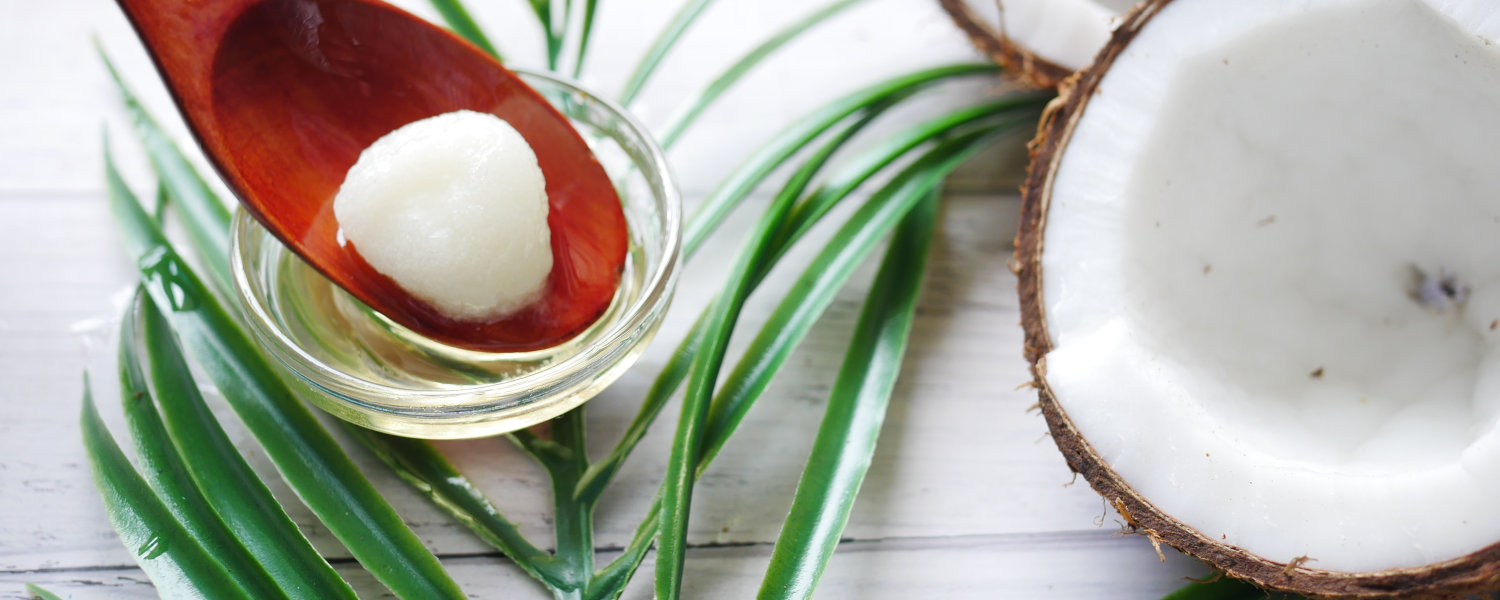In This Article
In recent years, many people have adopted coconut oil as a replacement for other fats in their diets. Coconut oil has seemingly endless uses, from cooking and baking to health and beauty to cannabis products (especially edibles). Baked goods are a popular infused option for at-home cannabis cooks, and coconut oil has quickly become one of the most common ingredients.
In this guide, we’ll discuss how to use coconut oil in infused recipes and when to use refined or unrefined coconut oil for the best-tasting edibles.
What Is Cannabis-Infused Coconut Oil?
Cannabis-infused coconut oil can be added to most weed recipes. Consumers and manufacturers have praised this popular ingredient for a wide variety of benefits: from helping cannabinoids like THC enter your body to its long shelf-life and offering consumers a healthier option high in saturated fat.
Making cannabis-infused coconut oil is also fairly simple (keep scrolling to learn how).
Refined vs. Unrefined Coconut Oil: What's The Difference?
When choosing between refined and unrefined coconut oil for edibles, you should know two main differences: the production process and what part of the coconut the oil is made from. These two factors can impact the cooking temperature (and other important factors) when making your edibles, so the two aren’t always interchangeable.
Unrefined Coconut Oil

Some chefs (and brands) refer to unrefined coconut oil as “virgin” or “extra-virgin.” All of these names mean the same thing and are helpful to remember when shopping for ingredients.
Unrefined coconut oil is produced by extracting and pressing the coconut meat to draw out the oils. Two different methods are used for this.
- The dry method utilizes heat to remove moisture before it is pressed.
- The wet method utilizes fresh coconut meat to produce milk and oil. The milk and oil are separated, typically using fermentation or specialized machines.
One important note is that unrefined coconut oil has a low smoke point of about 350℉. This makes unrefined coconut oil better suited for low-heat cooking, salad dressings, and topping off finished recipes. Heating your oil past its smoke point could cause it to break down, reducing flavor and nutrients. More importantly, heating oil past its smoke point could create fire or health risks.
Unrefined coconut oil has a strong scent and tastes like coconut (which isn’t the case with refined coconut oil). If you’re a fan of coconut flavor, unrefined oil might be the right choice.
One great feature of unrefined coconut oil is its long shelf life. The oil can last two to three years when stored correctly in a cool place and a sealed container.
Cannabis Storage Tip: Regardless of the product, keep all cannabis products in a clearly labeled container and out of reach of children or pets.
Refined Coconut Oil

Copra is dried coconut meat from which refined coconut oil is extracted. The copra passes through a machine that uses steam or heat to deodorize the oil and remove any impurities. This step is what differentiates refined from unrefined coconut oil.
Refined oil has a neutral scent and taste, making it a good choice for recipes that require oil but don’t need the coconut flavor.
Refined coconut oil also has a higher smoke range of 400-450℉, making it well-suited for frying and other high-heat recipes.
Refined oils have a shorter shelf life than unrefined options and are typically only good for a few months. It’s important to examine the oil before using it, paying careful attention to any signs of mold, an unusual flavor, or a yellow tint.
When to Use Refined and Unrefined Coconut Oil
In some situations, refined coconut oil is more suitable for a recipe than unrefined (and vice versa). Let’s look at considerations to keep in mind when backing and cooking with coconut oil.
Cannabis Baking with Coconut Oil

Coconut oil is featured in many cannabis baked goods, and it’s possible to use both refined and unrefined oil in these recipes (though unrefined coconut oil is more likely to bestow a strong coconut flavor in your finished dish).
Brownies are one of the most popular edible options that can be made with coconut oil, but the possibilities don’t end there! Cookies, homemade chocolate, and cupcakes can all safely incorporate coconut oil (which is also vegan-friendly!).
If your recipe has a flavor you don’t want to be compromised by coconut (like a strawberry or lemony dish), refined coconut oil is recommended. If, on the other hand, you want to add a hint of coconut to your baked goods, unrefined oil can do so without needing extra ingredients.
Cannabis Cooking with Coconut Oil

Cannabis coconut oil can also be used in savory dishes or condiments like salad dressing and pasta sauces.
Utilizing the strong flavor of unrefined coconut oil is a great way to expand the flavor profile of your dishes. Next time you’re making an infused curry, consider adding some unrefined coconut oil to take advantage of its incredible taste.
Refined or unrefined coconut oil is a great choice if you’re cooking on a lower heat, such as sautéing. If you are going to use coconut oil for frying, however, consider using refined oil, as it will withstand higher temperatures.
How to Make Cannabis Coconut Oil
From choosing the right oil to decarbing the cannabis to calculating dosage, it can feel overwhelming to make infused cannabis, especially if it’s your first time. Thankfully, the process is pretty simple, and it’s even easier when you have your own cannabis-infused coconut oil standing by. Here are the steps to follow to make infused coconut oil:
- Decarb 1 cup of your favorite cannabis flower to activate the THC.
- Once the flower is decarbed, break it into smaller pieces (but make sure the pieces aren’t small enough to go through the strainer).
- Melt the oil until it becomes liquid.
- Place the strainer or cheesecloth with your decarbed flower into the oil.
- Let the mixture simmer for 2-3 hours on low heat.
- Once the oil has turned a dark green color, remove the flower and let the oil cool.
Store your infused coconut oil in a cool and dry place to get the most out of your infused coconut oil.
Final Thoughts
Making edibles at home is a great way to control the ingredients and dosage. Both refined and unrefined coconut oil have health benefits and can easily be used during the cannabis infusion process.
Look for unrefined oil if you want a less processed option with a natural coconut flavor. However, if you want to skip the coconut taste and make sure that the impurities have been removed—or if you like cooking at high heat—consider buying refined oil.
The information in this article and any included images or charts are for educational purposes only. This information is neither a substitute for, nor does it replace, professional legal advice or medical advice, diagnosis, or treatment. If you have any concerns or questions about laws, regulations, or your health, you should always consult with an attorney, physician or other licensed professional.




